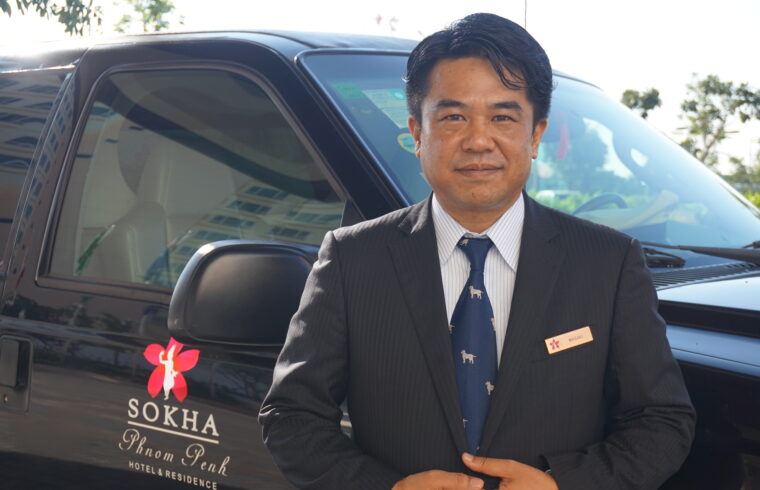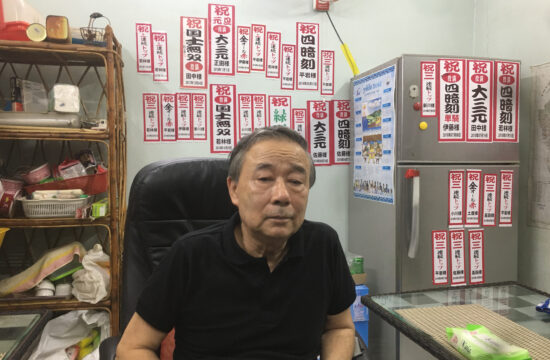Sokha Phnom Penh Hotel & Residence
Director of Business Development Mr. Masaki Nakamoto
– First, can you tell me about your opportunity to join Sokha Hotel and the motive behind that move?
First, I visited Cambodia for the first time in 1995 and worked at a hotel in Cambodia in 1997. After that, I moved to several countries such as Thailand, but I came back to Cambodia in April 2015 because I still wanted to work in a hotel in Cambodia, and because I can speak Khmer. At the time I joined, the hotel hadn’t been recruiting any staff, but by using old personal connections, I got an interview.
Although I had experience working in hotels, I had also a large network, I would like to start with a business, so I expressed my desire to work in the business development department.
In fact, I suppose I may only be able to develop the Japanese market because I am a Japanese person.
You are working in a Cambodian company. I mean is there any difference with Japanese companies?
I can’t say that clearly because I have never worked in a Japanese hotel, but I think usually most people continue to work in those hotels for their lifetimes once they have joined a Japanese hotel, which is the same way with an ordinary company.
However, in foreign countries, if the contract period expires, there is a negotiation of further agreements, and advancing their careers by moving to other hotels in case there’s no compromise is the mainstream. On the contrary, because companies do not look at the long run, I would say that point is a big difference.
– Then doesn’t the relationship with the staff become shallow?
It depends on the person. Some people think only of their careers, while others try hard to nurture their staff. However, my theory is that we should not try to learn Khmer from the staff.
Because at that moment, the position of the side that teaches, and the side that is taught will become the opposite. Japanese people would also be able to switch firmly, but Cambodians cannot switch. Furthermore, it sounds childish when foreigners forcibly speak Khmer. When this sort of thing adds up, the boss will be looked down on. In other words, you would be looked down on.
In particular, Japanese people learn Khmer from the staff or speak with smatterings of Khmer as part of their communication with the staff, so they become friends. In addition, such a thing will appear to result in such as a delay of the due date of work. Of course, if you can speak Khmer more than at a basic level, I think it is better to talk in Khmer because when speaking in Khmer, it will be more convincing.
– Please tell us if there are good things when working in foreign companies.
Especially in Southeast Asia, many companies have no substantial fringe benefits -even Japanese companies. It is at that point that foreign companies are generous. That’s especially the case with Sokha, which has also an employee-only clinic, so I would say it is first class.
In terms of the more practical aspects, since the decision is quick, the realization of what you want to do is faster.
It’s so fast, that we are desperate to catch up in reverse.
– Finally, please give some advice to young people who want to work abroad or want to work in foreign companies from now on.
It is “work in Japan”.
Better not to leave Japan. First, if you are a Japanese person, it is better for you to learn Japanese business customs and courtesy in Japan.
This is because you still need to socialize with Japanese people even if you work abroad, though in a foreign company. In addition, you can’t determine the presence or absence of such sophistication in the case of foreign companies, and you will always have a Japanese partner.
At that time, you must be able to explain on your own or take measures; otherwise, you will disappoint the company.
While people are still young, I recommend training in Japan.
– This interview was a real eye-opener. The fact that Japanese people are active in this country Cambodia, yet in a Cambodian company, is something to be proud of and also pleasing. I wish Mr.Nakamoto great success in the future.











